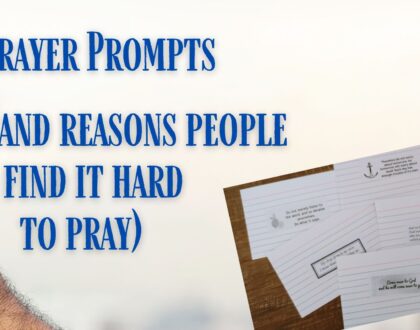The Yes or No List
by Westminster
We all need a permanent vacation from complication. Who’s with me!
Life gets fast and furious. Demands get thrown at you like water balloons at a kindergarten fun day. Next thing you know, you’ve said yes to so many things you barely have time to go to the bathroom.
So we need to learn how to say Yes to the right things and to No to the wrong things.
But how?
On Sunday I talked about “The Yes or No List.” It’s inspired by the story of the Rich Young Ruler and an expression I heard that “Sometimes your best Yes is No.” (My friend Heather Malnick told me about it and said a friend read it in a book somewhere, perhaps Lysa TerKeurst’s “The Best Yes.”)
The idea is that when you say No to many of the requests for your time and attention, you are actually saying Yes to more important priorities. I firmly believe that people who are over-committed are un-committed. By over-stretching yourself you are watering down your effectiveness in different areas of life.
"People who are over-committed are under-committed." #TheUpDevo
— Matthew Ruttan (@MatthewRuttan) September 27, 2016
Enter “The Yes or No List.” I’ve been using it for a while. I think it’s a biblical way to prioritize your time and attention. I’ll lay it out and then explain how it works:
1. Jesus
2. Spouse
3. Children
4. Parents
5. Church Family
6. Everyone Else, especially the poor
Whenever someone comes to you with a demand or request for your time and attention, you need to ask yourself, “Does this help me or hinder me from honouring these priorities?”
Maybe you get invited to something or asked to participate in a committee. Maybe it’s how you spend your time online. How do you decide what to prioritize? After all, you want to be nice, right?
1. Jesus
This is number one. This involves not only making time for him, but approaching everything we do with his values. “Whoever wants to be my disciple must deny themselves and take up their cross daily and follow me” (Luke 8:23). The biblical command to love God with all your heart, soul, mind and strength trumps everything (Mark 12:30).
So ask yourself, “Does a request on my time and attention allow me to keep Jesus priority number one?”
 2. Spouse
2. Spouse
Numbers 2 and 3 are related to 1 Timothy 5:8 in the Bible.
When the experienced and well-educated Paul is giving advice to a young upstart named Timothy, he includes a section about caring for others: “Anyone who does not provide for their relatives, and especially for their own household, has denied the faith and is worse than an unbeliever.” The old King James Version says “worse than an infidel.”
Um, that’s pretty bold.
We can assume he was addressing male leaders of families who, especially in the 1st century, had responsibility for ensuring needs were met. But apply that thinking to your own household today.
If you have a spouse, s/he is a sacred trust from God and you have made a vow before the Almighty to honour and prioritize them through thick and thin. So when a request comes in for your time and attention, ask yourself, “Does this draw me too far away from being a provider—physically, emotionally and spiritually—for those in my own household?”
3. Children
Building on that, your children are also a sacred trust.
One of the biggest tragedies in parenting today is a kind of presence that is actually absence. It’s so easy to be present but really be somewhere else—on the phone, thinking about work, stressing about things beyond your control. So ask yourself, “Does a request on my time and attention allow me to be truly present to my children?”
I’m not saying you won’t have to work late or be away sometimes. But most of the time, are you around to parent? Or are you just a parent?
4. Parents
“Honour your father and your mother…” (Exodus 20:12). In ancient Hebrew, the word “honour” is related to respect, weight and authority—the idea being that we are to give our parents their due place and priority in our lives. You may not always agree with them, but we’re commanded to honour them. It’s not a suggestion.
So ask yourself, “Does this request on my time and attention leave me unavailable to care for and prioritize my parents?”
5. Church Family
Toward the end of his fiery letter to the Galatians in the Bible, Paul stresses the importance of “doing good to all people, especially to those who belong to the family of believers” (Galatians 6:10). In that passage there seems to be a priority for the “family of believers” (meaning the church).
Your church family is a priority. You might struggle with this one, partly because we live in an era when it’s easy to think about the church community like a consumable commodity. People at church can seem like pleasant-ish strangers who just so happen to attend some of the same services we do.
But the church is set up by God to be a vessel for his work in the world. It’s not perfect. (But pssst, neither are you.) So when a request on your time or attention comes up, ask yourself, “Does this leave me unavailable to care for my church family?” When you neglect your church family you’re handicapping it’s effectiveness as an agent of light in the world.
6. All people, especially the poor
It’s clear that caring for others and justice is non-negotiable. Early in Israelite history it was envisioned that if people fully obeyed God, there should be no poor among them (Deuteronomy 15:4).
One of Jesus’ most famous stories is of the Good Samaritan. Let me wildly condense it for you: Your neighbour is anyone—anyone at all—who is in need. So that love-your-neighbour-as-yourself thing seems to be underlined and highlighted with God’s own pen.
So when a request is made of your time, ask yourself, “Am I ordering my life in a way that allows me to care for others, especially those who are less fortunate?”
If your week has no spaces, it has few places for you to help others when the need arises.
1. Jesus
2. Spouse
3. Children
4. Parents
5. Church Family
6. All people, especially the poor
Why is all of this important? Because a great life is about giving. And here’s the thing:
You can’t give when you have nothing left to give.
 Too many of us have complicated our schedules to the point where we truly WANT to serve and help others, but we’re too tired or too busy. People who are over-committed are un-committed.
Too many of us have complicated our schedules to the point where we truly WANT to serve and help others, but we’re too tired or too busy. People who are over-committed are un-committed.
Simplicity is clarity. A permanent complication vacation happens when you know your priorities and order your life around them.
Maybe I just lost you because you think this is too simplistic or legalistic. I agree that it could quickly turn into an excuse to become insular.
But that would be a mistake. This is a general guide. Situations arise where we should put everything on hold to pursue what’s urgent and important, especially when we feel God is leading us in that direction.
There will also be seasons in your life that have different emphases based on your circumstances.
I should also say that when it comes to family, Jesus himself said that his own mothers and brothers were “whoever does the will of my Father in heaven” (Matthew 12:50). And he said that while his biological mother and brothers were standing right there! God’s will always comes first.
You also need to think about yourself. You can’t love your neighbour “as yourself” if you treat yourself like yesterday’s leftover lunch meat.
Perhaps a good way to use “The Yes or No List” is as a guard against chaos. It can help us be thoughtful about our day-to-day priorities, especially when we’ve become so good at complicating our schedules… which is kind of like putting on handcuffs.
 I think the “Yes or No List” will yield at least two benefits:
I think the “Yes or No List” will yield at least two benefits:
First, you’ll re-introduce balance into your schedule. As a result, you’ll be better rested; you’ll think more clearly; you’ll have more energy; and you’ll be more joyful.
Second, when opportunities come up to serve and bless others, you’ll be more willing and able to help. And when you do, it will feel less like a burden and more like a joy.
Remember, you can’t give when you’ve got nothing left to give.
So give it a shot and take a permanent complication vacation. “Sometimes your best Yes is No.”
"We all need a permanent vacation from complication." #TheUpDevo
— Matthew Ruttan (@MatthewRuttan) September 27, 2016
Recommended Posts

Our WPC love comes full circle
July 17, 2023

Recap, Re-load or Rewind: Faith-at-Home FOCI chart
August 08, 2021
